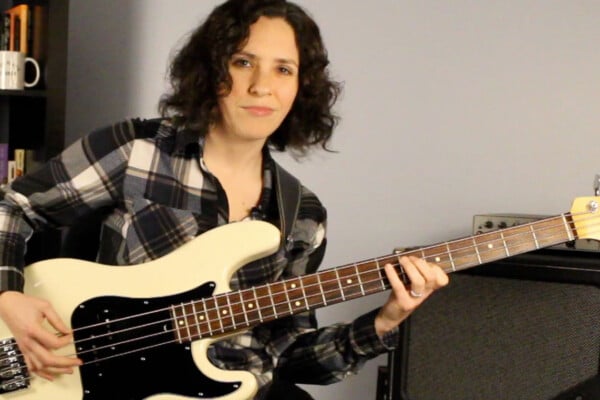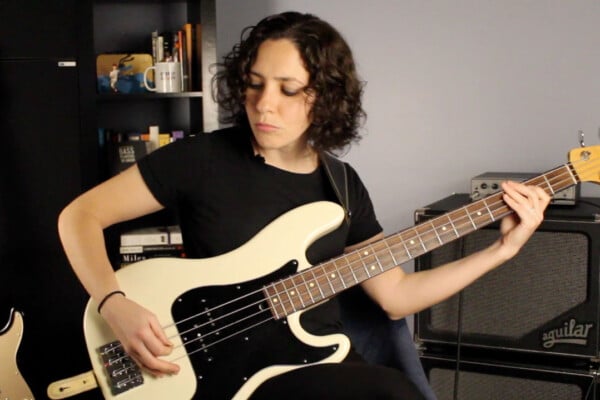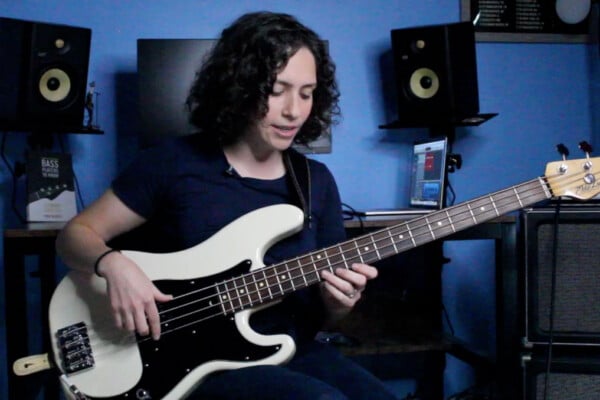Walking Bass (and Getting Away from Tab)
Q: I’d like to learn to create walking bass lines. I don’t read music so tabs would be preferred.
A: Learning to walk is immensely helpful in so many ways. It helps you see the inter-connectivity between chords, helps develop a good time-feel and helps you explore how the arc of a line can affect the feel of the music.
The first thing I would implore you to do is to get AWAY from tab and work on reading a little everyday. If you really want to get to a comfortable place with music, you’ll need to be able to read it. It’s like relying on the images on signs out in the world to get around the world and not being able to read the text. At the VERY LEAST, get comfortable playing a tune based solely on the lead sheet or chord chart.
In order to walk on the bass, you’ll need to know what notes are available to you in any given chord. This means having a solid grasp on:
- SCALES (SOLID grasp. if you have to think about it, it’s not a solid grasp. And not only in one position and always starting on the root. you need to work them in every possible way and starting on every note of the scale (modes). If you only learn to do something one way, you’ll only ever be able to apply it one way, which leaves out the other hundred ways you could use that knowledge)
- ARPEGGIOS in all inversions and for every chord type
- CHORD shapes. at least a rudimentary understanding but, ideally, also in all inversions, etc.
I’ve found that having these things under your fingers help immensely with walking. When walking, you need to be able to assess where you are and know what notes are available to you in regard to where you are going.
In essence, all you are doing when walking is providing a nice rhythmic pulse and playing a primarily linear and musical line that weaves through the chord changes. Because of this, it’s essential to understand what notes are available to you when you see a G-7b5 chord for example.
There are many resources online or in millions of books to help you discover these things. I have a book available at CDbaby.com which gives quick overviews of many of these things. I’m including one page (PDF download) from the section on walking here for you to take a look at. There is some information on approach tones here, and there are other books which go much more in depth. It really just takes the work to understand this stuff. Rufus Reid’s The Evolving Bassist is a wonderful book definitely worth having!
Now, there are also a TON of great bassists who learn by ear and didn’t connect what they knew how to do with the actual technical theory behind it until much later. This is also a perfectly fine way to do it. Your ears are your best friend and if you learn to rely on them early on, it’s never a bad thing. A word of warning though…
These folks learn by ear by PLAYING ALL OF THE TIME and with other players who help them push their understanding of the instrument. You simply can NOT sit in your room saying “I’ll just get it together by ear, I don’t need the theory stuff” and noodle for hours thinking that you’ll magically “get it”. You need to be out playing with other people, listening HARD, making mistakes and correcting them on the spot and constantly striving and pushing.
I once had a student who said, “Well, Jaco didn’t learn to read until he was in Weather Report!”
This is true, he was an ear player, ad it wasn’t until Joe Zawinul forced him to read that he really got it together in that arena.
My reply was, “That’s true! the only difference is, Jaco was out playing music seven nights a week and practicing into the wee hours of the morning. He lived and breathed music and learned to play what he heard. If you do that, then yeah, you might be able to get along. I still guarantee that you’ll wish you had put in the time now, though. How many hours did you spend with the bass in your hands last week?”
The best route, in my opinion, is to marry the two practices. Learn about chords and scales, but also practice playing with recordings or with other people with the real book closed and train your ears to help guide you.
Not to get on a tangent, but… I’m amazed at how many young players think they can NOT learn the tedious stuff and still be Jaco or Victor when they grow up. In truth, you CAN!! But you can only achieve musical greatness through a LOVE of the instrument and music. The most important thing is that you play all of the time! You can’t help but learn if you have a hard time putting the instrument down. And, in fact, you will learn this stuff anyway because you’ll want to learn everything you can to make you a better player.
While it’s true that learning to read isn’t absolutely necessary to become a wonderful musician, putting in the work IS necessary. There is no ONE way to do anything, but there is one absolute. If you don’t work hard, it will not come. Outside of that, everyone’s path is different. I still maintain that knowledge is never a bad thing… the more you know, the better off you are and if you avoid ANY work because it’s not as much fun, you hurt your playing. You can’t download talent!! Genius is really just another word for hard and obsessive work.
Have a question for Damian Erskine? Send it to [email protected]. Check out Damian’s instructional books, Right Hand Drive and The Improviser’s Path.




“While it’s true that learning to read isn’t absolutely necessary to become a wonderful musician”
I agree with this statement in the abstract sense and would only add that; not learning read will only narrow your outlets. Jaco, Victor, et al. are the exceptions and far/few in between. If you want to maximize your value as a ‘professional’ musician you need to have your tool box as full as possible.
You don’t want to have to turn down a call for a studio session because you can’t read, nor will the producers be willing to let you burn up expensive hours in the studio because you can’t read the music they had prepared for the piece, the list of such examples goes on and on.
$0.02
-BVB
Walking Bass is a musical language. You can learn the theory behind it from books, like you can learn grammar of any language. But learning the sound of it comes from hearing it, and listening to it. The problem nowadays is there’s so much music available few people listen to things in depth. When I started out playing bass, I listened to Paul Chambers’ “Whims of Chambers” at least once a day for years. That’s how walking bass became a part of me. Of course I listened to a lot more, but focusing on a few recordings of the masters is, in my opinion, the best way to get a grasp on what any type of music is really about.
Great as always DE. Very well-written, too.
I’m sure in the modern electric bass video Jaco said he was reading way before he joined Weather Report.
From someone who had Damian to guide him through the ‘learning to read’ process, you can’t put it much better than Damian just put it. Don’t I wish I learned 20 years ago what I finally learned in the last few.
I agree , Damian—tab is absolutely 100% useless. Theoretical knowledge never hurts and I think knowing how to read can be a BIG advantage in many situations. I don’t read too well myself, but I’m trying to remedy the problem at present.
I agree, I am currently struggling to read chord changes, and I just learned to read a shuffle blues, it helped me with other Jazz songs that I am learning and also I think learning scales in a shuffle or any rhythm pattern can help tremendously in jazz especially.
I disagree that tab is useless. I started out learning tab, and it made me want to learn how to read music. It’s a slow process but i’m getting better with the F clef. Anytime a person is willing to use the tools available there is a chance to reach further.
From personal experience, I have been learning/self taught since I started 6 years ago, learning the basics of the guitar before I moved to the bass.
Learning by ear is a great way to learn the nuances of a song while playing with others as mentioned in the article, but there are times when TAB does benefit me…
99% of the time I want to refer to tab just to find a particular note or a starting point. Someone may have tabbed out a run which is used in the song and the TAB helps me to learn how to play the run, position and string wise and its up to me to know the tempo and detail of the notes being played based on the song I am learning.
There are times listening to a song where I cannot quite pick out a note that the BASS is supposed to play because of the other instruments being played, and the TAB gives me a spot I can go to.
Granted TAB is not always accurate, and many argue that reading TAB most of the time does not tell you anything about the note you are supposed to play, e.g. note length, attack, sustain, etc, however; if you are playing by ear, you should have a pretty good handle on that information and the tab just shows you where you should be.
Yeah, the chord charts and actual musical notation defines the music but it may not always be available. As everyone knows, guitar tab is all over the internet and is for the most part interpretations from an individual of a song, but it is still a reference none the less. If it’s wrong it doesn’t take long to determine that and correct it.
IMHO Tab is not useless and can make a good reference.
TAB is not 100% useless…. but it is mostly useless.
I believe that your ears are the first thing you need to develop. Then you need to understand what you are hearing…that’s theory. Next you learn to read the material… Reading music. Then and only then can TAB, properly done by someone who has all the stuff before, be of any use. But what ever technique you use to learn music, and about music… the most important first lesson is “You will not learn anything unless you practise, and except that you must learn all the tools”.
I don’t want to say tabs are worse or so. But I guess there is more proper music available as sheet music. I guess there are no TABS in a philharmonic orchestra or a professional big band. You need to be able to read music fluently. And I also think – tabs teach you more finger patterns, while reading music teaches you theoretic knowledge, and how things are related to each other, that you can understand it and create your own things within the knowledge. It is how they study in Academies of Music at jazz departments. It is just a bit higher lever. My experience says – very useful.
[…] 3. Walking Bass (and getting away from tab) […]